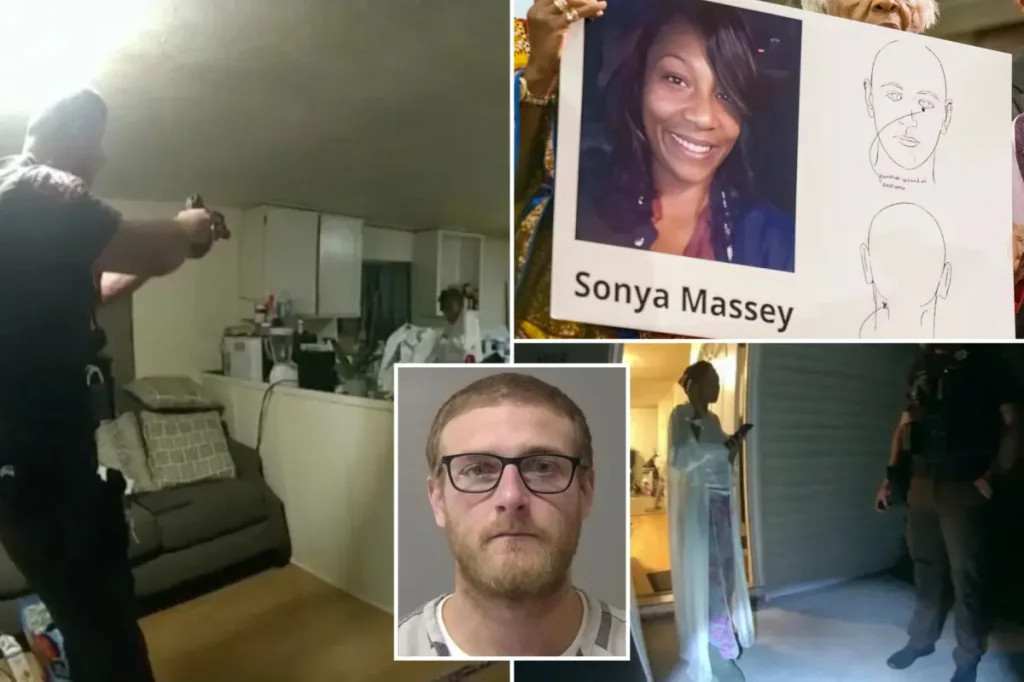Tragic Encounter: Former Deputy Convicted in Death of Woman Who Called 911 for Help
In a case that has drawn national attention and led to significant changes in Illinois law, a jury has found former sheriff’s deputy Sean Grayson guilty of second-degree murder in the shooting death of Sonya Massey, a 36-year-old Black woman who had called 911 seeking help with a prowler at her Springfield home. The verdict, delivered after a seven-day trial, rejected prosecutors’ pursuit of first-degree murder charges but still leaves Grayson facing up to 20 years in prison when sentenced on January 29, though probation remains a possibility. The tragic events of July 6, 2024, unfolded in Massey’s kitchen after she had called authorities reporting an intruder, only to end up dead at the hands of someone sworn to protect her. This case has joined a troubling pattern of incidents where Black Americans have been killed by law enforcement in their own homes, raising profound questions about policing practices, racial bias, and how authorities respond to mental health situations.
Body camera footage from Deputy Dawson Farley, who accompanied Grayson to Massey’s home that morning, became central to the prosecution’s case and provides a haunting window into the fatal encounter. The video captured Massey, who struggled with mental health issues, pleading “Don’t hurt me” and repeating “Please God” as officers entered her home. The situation escalated when Grayson noticed a pot of hot water on Massey’s stove and ordered her to move it. After Massey retrieved the pot, there was a moment of apparent levity when Grayson commented about backing away from the “hot, steaming water.” The situation took a deadly turn, however, when Massey stated, “I rebuke you in the name of Jesus” – a phrase that Grayson later claimed he interpreted as a death threat. Both deputies drew their weapons and ordered Massey to put down the pot. In the chaos that followed, Grayson fired three shots, striking Massey just below the eye in what proved to be a fatal wound.
The trial revealed starkly different interpretations of the threat level Massey posed that morning. Grayson, taking the stand in his own defense, testified that he noticed the bottom of the pot was red and believed Massey intended to throw the scalding water at him. He claimed her “rebuke” comment felt threatening and that he drew his weapon because “officers are trained to use force to get compliance.” Deputy Farley, however, testified that Massey hadn’t said or done anything that made him perceive her as a threat, though under cross-examination, he acknowledged initially telling investigators he had feared for his safety because of the hot water. Farley, a probationary employee at the time who could have been fired for any reason, did not discharge his weapon during the encounter. The jury’s decision to convict on second-degree murder rather than first-degree suggests they believed Grayson genuinely, if unreasonably, thought he was justified in shooting Massey or was responding to what he perceived as “serious provocation.”
Perhaps most disturbing were Grayson’s actions immediately after shooting Massey. Body camera footage captured him telling Farley, “She done. You can go get it, but that’s a head shot. There’s nothing you can do, man.” Though Grayson briefly attempted to retrieve his medical kit, when Farley told him his help wasn’t necessary, Grayson tossed the kit on the floor declaring, “I’m not even gonna waste my med stuff then.” Prosecutors argued this callous response demonstrated Grayson’s disregard for public safety, a point that initially persuaded Judge Ryan Cadagin to keep Grayson jailed pending trial. An Illinois appellate court later ruled he should be released under the Pre-Trial Fairness Act, though an appeal to the state Supreme Court remains undecided. The shocking indifference displayed in those moments after taking a human life became a powerful element of the state’s case against the former deputy.
The reverberations from Massey’s killing have extended far beyond the courtroom. Her death forced the early retirement of the sheriff who had hired Grayson and prompted a U.S. Justice Department inquiry into the Sangamon County Sheriff’s Department. That federal investigation concluded with the department agreeing to strengthen training, particularly in de-escalation techniques; develop a program allowing mental health professionals to respond to certain emergency calls; and generate comprehensive data on use-of-force incidents. These reforms represent concrete steps toward addressing the systemic issues that contributed to this tragedy, though they come too late for Massey and her loved ones. Her family, represented by prominent civil rights attorney Ben Crump, reached a $10 million settlement with Sangamon County, acknowledging the magnitude of their loss while ensuring some measure of financial accountability.
Perhaps the most lasting impact of this tragedy may be legislative. Massey’s death spurred Illinois lawmakers to change state law, requiring greater transparency regarding the background of law enforcement job candidates. This reform, often referred to as “Sonya’s Law,” aims to prevent individuals with concerning histories from moving between departments without proper scrutiny. As Grayson awaits sentencing in January, the case stands as a somber reminder of how quickly a call for help can turn deadly, particularly for people of color and those experiencing mental health challenges. For Massey’s family and community, the second-degree murder conviction brings a measure of justice, but it cannot restore what was lost that July morning when a woman in distress called 911, only to be killed by someone sent to protect her. The tragedy has forced difficult but necessary conversations about policing, race, mental health response, and the sacred trust placed in those who carry badges and guns in American communities.


